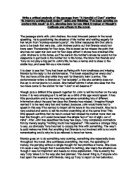John Proctor makes a number of decisions throughout the play all a different fork in the road that leads to his final destiny, all leading to his final culminating decision. The first Major decision that John makes is when Elizabeth is taken to court, and John decides to take Mary and go to the court to expose Abigail’s lie "you're coming to the court with me, Mary. You will tell it in court". This is a significant decision as John knows fine well that his challenging of the court could very well expose his own impurities i.e. his affair with Abigail Williams, or could condemn himself, but fuelled by love and a tremendous sense of integrity and bravery he continues down this path. Next John is faced with the decision of wither to simply accept the offer of his wife’s freedom (for a year) or to battle on to save her and his friends indefinitely. Upon being asked if he would accept these terms he stated " I-I think I cannot" then "these are my friends. Their wives are also accused..." so consequently John refuses the easy option of backing down and coming to a compromise. Instead he bravely wishes to fight on against the odds for the greater good and free all the innocent people from false accusation and give them the freedom they truly deserve. Once again Proctor is fully aware of the implementations that this could have bravely battling at the risk of being found out. The next decision that John Proctor makes is one of great significance, and one that involves great pain and embarrassment for him. In the difficult situation of having Abigail wining over the court John proctor is forced to prove that Abigail isn’t the saint she proclaims to be, after previous evidence failing and in a desperate situation John is forced to bring up his affair with Abigail, as this will disclose the true nature of Abigail’s character and show her to be a fraud. He confesses, " I have know her, sir I have know her." in this theatrical public confession John puts his own name on the line, his name that is of such significance to this man of his principles. He makes this decision purely for the good of others and to stop the wickedness of Abigail. Unfortunately for John once again Abigail fools the court and all his efforts seem to be in vain. In a fit of anger, and frustration he makes a fateful decision, he decides to speak straight from his blackened heart, one dirty by everyone’s naive belief in such lies. He screams " I say- I say- God is dead!" this outburst seals his fate which is even tighter sealed when he says "...we will burn, we will burn together!” and sums up the proceeding by saying "You are pulling down heaven and raising up a whore!” John throughout the book fights a terrible battle with the court, and believers of Abigail, but probably the greatest battle John Proctor has to deal with is his own personal conflict with his conscious. When presented with the opportunity to live (if he would only betray his principles), John has to consider his own life, and his principles and decide which matters the most to him. Her fights a tremendous struggle changing his mind several times to find an outcome true to him. After intense deliberation with his wife, Elizabeth tells John “ Do what you will. But let none be your judge...” so then Proctor decides, “I want my life”. This first decision shows that his wife and will to live are very strong within him, and wins this first battle that is John’s war inside his conscious. John is angered by the courts constant antagonistic requests, and at first offering refuses to signing himself to his confession. John proclaims “You have all witnessed it- it is enough.” Continuing “…what more is needed?”. Eventually John signs himself to the document when all the while the true feeling in his heart grows stronger, fuelled by rage. Proctor is hounded more as Danforth asks for the paper john refuses “No, no, I have signed it. You have seen me. It is done!”. The confused court ask Proctor why he may confess but not sign his name, then proctor speaks straight from the soul with all his true feelings “Because it is my name! Because I cannot have another in my life! Because I lie and sign myself to lies! Because I am not worth the dust on the feet of those who hang! How may I live without my name?”
Now proctor has made his final decision and come to the end of his path, his various decisions throughout the play all culminate to his death. Proctors principles and honour have won at the sacrifice of his life, but the true pure Christian light of his soul has shone through in the end and John Proctor has died a content and honorable man. The title is significant due to the similarities of an actual crucible to the heated situation of Salem. In this “crucible” that John found himself in all the impurities of the town of Salem, and all those deep inside him have all been incinerated, and the truly good and pure people (including john) have emerged. John has emerged pure, good and enlightened. John’s final decision (not understood by most) is wonderfully summed up by his wife’s brave realization “He has his goodness now. God forbid I take it from him!” Proctor no longer is tormented by the impurities of his soul or of lies, he is free now, he is at ease, and he is with God. He died a true Christian man, the way he always wanted.







